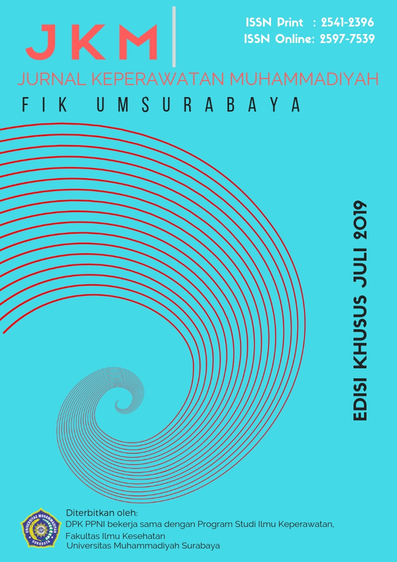Strategi Coping Terhadap Stress Kerja Pada Perawat di Rumah Sakit: Literatur Review
DOI:
https://doi.org/10.30651/jkm.v4i2.2599Keywords:
Coping Strategy, Work Stress, NurseAbstract
Background: Increased work stress on nurses is caused by the high demands of work and must be maximal in serving patients at the hospital. Nurses are required to have a way of completing and adjusting conditions to the problem which is usually referred to as coping, so that they can carry out their professional work professionally. Objective: To find out the coping strategies used by nurses in dealing with work stress in the hospital environment. Method: This literature review uses database the Ebsco, Google Scholar, DOAJ, and Pubmed. At the beginning of the search with keywords: "Coping Strategy" OR "Work Stress" AND "Nurse" obtained a total of 536,394 articles, after being screened by observe the inclusion criteria obtained 10 international articles from 2015 to 2019. Results: Stress relationships and coping strategies, indicate that the level of work pressure will be low when nurses take a positive coping strategy in the face of work stress. Some of the factors that influence coping from the literature results include self-concept, socio-economic status, social support, experience, social skills, and personality characteristics. Conclusion: Nurses in handling work stress prefer to use adaptive coping strategies that focus on problem focused coping rather than using emotion focused coping.
References
Bregar, B., Skela-SaviÄ, B., & Kores PlesniÄar, B. (2018). Cross-sectional study on nurses’ attitudes regarding coercive measures: the importance of socio-demographic characteristics, job satisfaction, and strategies for coping with stress. BMC Psychiatry, 18(1). https://doi.org/10.1186/s12888-018-1756-1
Croxson, C. H., Ashdown, H. F., & Hobbs, F. R. (2017). GPs’ perceptions of workload in England: a qualitative interview study. British Journal of General Practice, 67(655), e138–e147. https://doi.org/10.3399/bjgp17X688849
Hasan, A. A., elsayed, S., & Tumah, H. (2018). Occupational stress, coping strategies, and psychological-related outcomes of nurses working in psychiatric hospitals. Perspectives in Psychiatric Care, 54(4), 514–522. https://doi.org/10.1111/ppc.12262
Herqutanto, Harsono, H., Damayanti, M., & Setiawati, E. P. (2017). Stres Kerja pada Perawat di Rumah Sakit dan Fasilitas Pelayanan Kesehatan Primer. eJournal Kedokteran Indonesia, 5(1). https://doi.org/10.23886/ejki.5.7444.12-7
Jan, F. (2017). Coping Strategies Used by Staff Nurses Working in Emergency and General Wards of SKIMS Hospital: A Comparative Study. Annals of Medical and Health Sciences Research, 7(1), 8.
Laras, A. (2016). Coping Terhadap Stress Kerja Pada Perawat Yang Pernah Menangani Pasien Hiv/Aids, 5, 4.
Li, L., Ai, H., Gao, L., Zhou, H., Liu, X., Zhang, Z., Fan, L. (2017). Moderating effects of coping on work stress and job performance for nurses in tertiary hospitals: a cross-sectional survey in China. BMC Health Services Research, 17(1). https://doi.org/10.1186/s12913-017-2348-3
Lievrouw, A., Vanheule, S., Deveugele, M., Vos, M., Pattyn, P., Belle, V., & Benoit, D. (2016). Coping With Moral Distress in Oncology Practice: Nurse and Physician Strategies. Oncology Nursing Forum, 43(4), 505–512. https://doi.org/10.1188/16.ONF.505-512
Lu, D.-M., Sun, N., Hong, S., Fan, Y., Kong, F., & Li, Q. (2015). Occupational Stress and Coping Strategies Among Emergency Department Nurses of China. Archives of Psychiatric Nursing, 29(4), 208–212. https://doi.org/10.1016/j.apnu.2014.11.006
Maryam, S. (2017). Strategi Coping: Teori Dan Sumberdayanya. JURKAM: Jurnal Konseling Andi Matappa, 1(2), 101. https://doi.org/10.31100/jurkam.v1i2.12
Nugroho, A. S. (2012). Studi Deskriptif Burnout dan Coping Stres pada Perawat di Ruang Rawat Inap Rumah Sakit Jiwa Menur Surabaya, 6.
Prasetyo, W. (2017). Literature Review: Stres Perawat Di Ruang Instalasi Gawat Darurat, 5(1), 13.
Prima, W., Paskarini, I., Kes, M., & Fkm, K. K. (n.d.). Stres Pada Perawat Di Instalasi Rawat Inap Rumah Sakit Jiwa Menur Surabaya, 2009.
Roets, M., Poggenpoel, M., & Myburgh, C. (2018). Psychiatric nurses’ experience of aggression amongst colleagues. Health SA Gesondheid, 23. https://doi.org/10.4102/hsag.v23i0.1086
Sari, D. H. A., & Erwina, I. (2018). Relationship between Job Stress and Coping Mechanism in Psychiatric Nurse in National Mental Health Hospital, 1(1), 4.
Stress, Appraisal, and Coping - Richard S. Lazarus, PhD, Susan Folkman, PhD - Google Buku.htm. (n.d.)
Tesfaye, T. D. (2018). Coping strategies among nurses in South-west Ethiopia: descriptive, institution-based cross-sectional study. BMC Research Notes, 11(1). https://doi.org/10.1186/s13104-018-3557-5
Tsaras, K., Daglas, A., Mitsi, D., Papathanasiou, I. V., Tzavella, F., Zyga, S., & Fradelos, E. C. (2018). A cross-sectional study for the impact of coping strategies on mental health disorders among psychiatric nurses. Health Psychology Research, 6(1). https://doi.org/10.4081/hpr.2018.7466
Zarea, K., Fereidooni-Moghadam, M., Baraz, S., & Tahery, N. (2018). Challenges Encountered by Nurses Working in Acute Psychiatric Wards: A Qualitative Study in Iran. Issues in Mental Health Nursing, 39(3), 244–250. https://doi.org/10.1080/01612840.2017.1377327
Zavotsky, K. E., & Chan, G. K. (2016). Exploring the Relationship Among Moral Distress, Coping, and the Practice Environment in Emergency Department Nurses: Advanced Emergency Nursing Journal, 38(2), 133–146. https://doi.org/10.1097/TME.0000000000000100
Zhou, H., & Gong, Y.-H. (2015). Relationship between occupational stress and coping strategy among operating theatre nurses in China: a questionnaire survey. Journal of Nursing Management, 23(1), 96–106. https://doi.org/10.1111/jonm.12094
Zyga, S., Mitrousi, S., Alikari, V., Sachlas, A., Stathoulis, J., Fradelos, E., Maria, L. (2016). Assessing Factors That Affect Coping Strategies Among Nursing Personnel. Materia Socio Medica, 28(2), 146. https://doi.org/10.5455/msm.2016.28.146-150
Downloads
Published
Issue
Section
License
- Penulis tetap memegang hak atas karyanya dan memberikan hak publikasi pertama kepada jurnal ini yang secara simultan karya tersebut dilisensikan di bawah:Â Creative Commons Attribution-ShareAlike 4.0 International (CC BY-SA 4.0)













